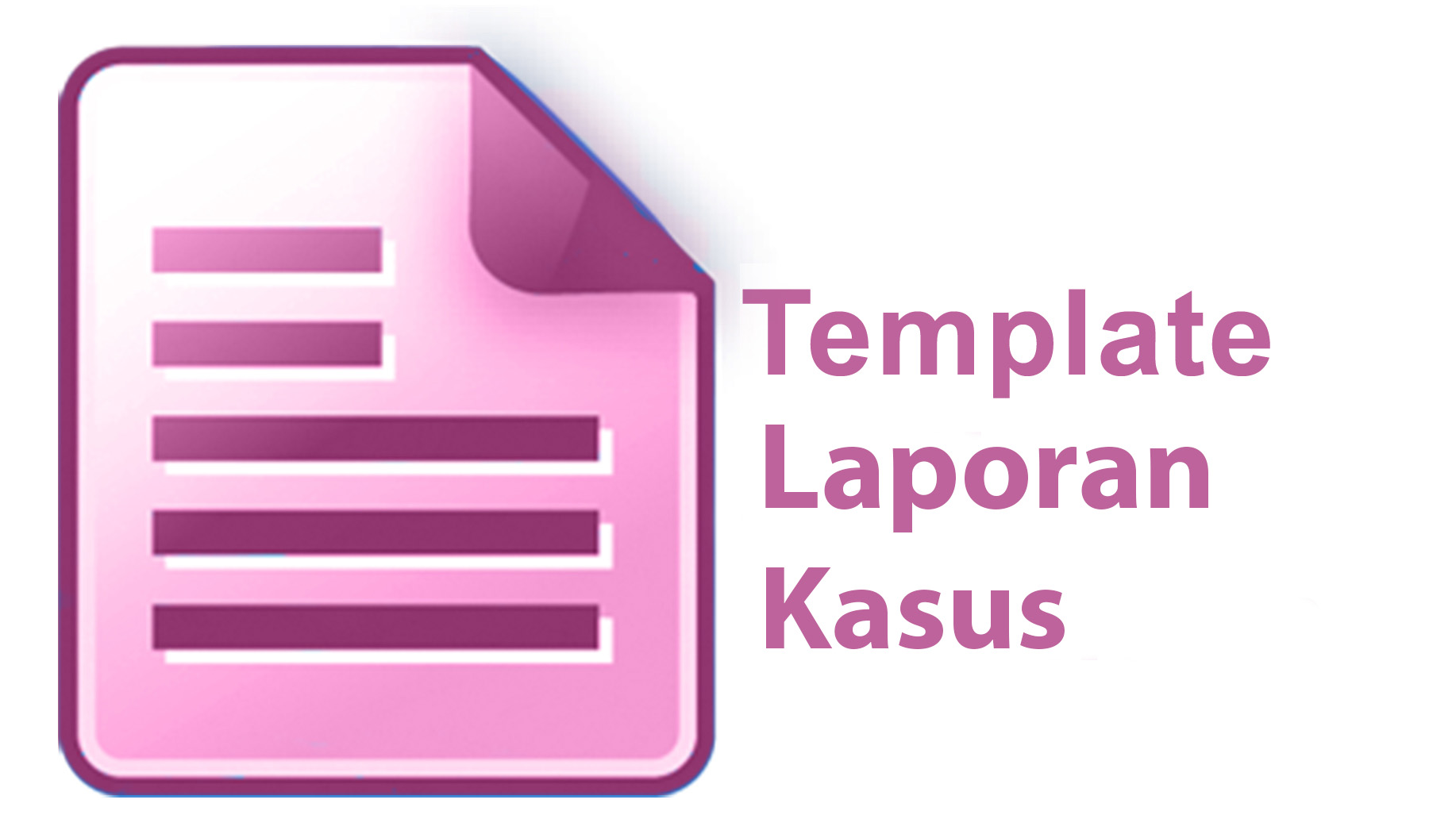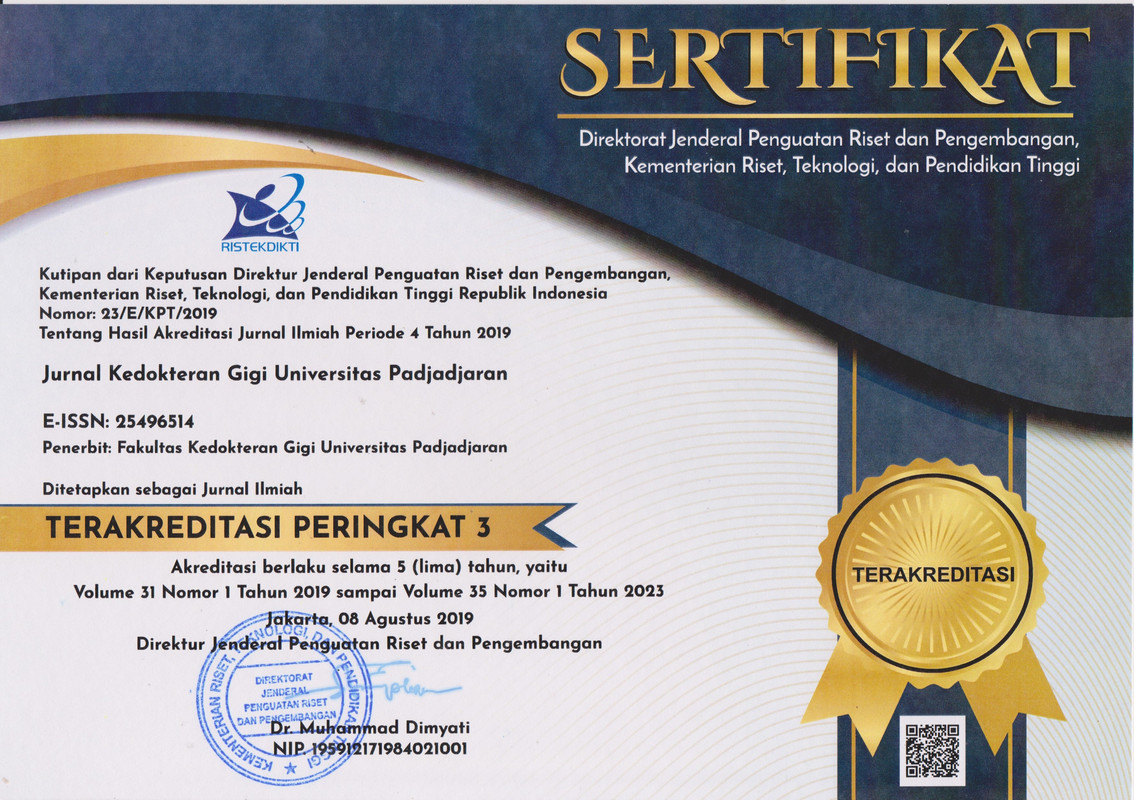Hubungan kemampuan mastikasi pemakai gigi tiruan lengkap dengan kekuatan gigit, ketebalan musculus masseter, kemampuan kognitif, dan kualitas hidup lansia
Relationship between the masticatory ability of complete denture wearers with bite force, thickness of muscle masseter, cognitive function, and quality of life in elderlyAbstract
Pendahuluan: Lansia adalah kelompok masyarakat berusia di atas 60 tahun dan mengalami proses penuaan yang disertai dengan beberapa perubahan seperti perubahan fisiologis, rongga mulut, psikologis, maupun sosial. Kehilangan gigi seluruh merupakan salah satu contoh perubahan rongga mulut yang terjadi dan dapat ditatalaksana dengan menggunakan gigi tiruan lengkap (GTL) yang berfungsi untuk memperbaiki fungsi estetik, mastikasi, dan fonetik. Kemampuan mastikasi merupakan hal yang penting karena berhubungan dengan kekuatan gigit, ketebalan M. masseter, kemampuan kognitif, dan kualitas hidup pada lansia. Penelitian ini bertujuan untuk menganalisis hubungan kemampuan mastikasi pemakai gigi tiruan lengkap dengan kekuatan gigit, ketebalan M. masseter, kemampuan kognitif, dan kualitas hidup pada lansia. Metode: Jenis penelitian ini adalah observasional analitik secara cross sectional dengan menggunakan kuesioner Mini Mental State Examination (MMSE) untuk menilai kemampuan kognitif, kuesioner Oral Health Impact Profile for Edentulous (OHIP-EDENT) untuk menilai kualitas hidup, masticatory performance evaluating gum untuk menilai kemampuan mastikasi, alat ultrasound portable untuk menilai ketebalan M.masseter, alat flexiforce untuk menilai kekuatan gigit. Total responden yang terlibat sebanyak 62 lansia. Hasil: Hasil penelitian dengan menggunakan uji Pearson menunjukkan hubungan antara kemampuan mastikasi pemakai gigi tiruan lengkap dengan kekuatan gigit (r=0,914), ketebalan M. masseter (r=0,783), kemampuan kognitif (r=0,791), dan kualitas hidup (r=0,909) dan dengan Spearman’s rho didapatkan nilai p=0,01 dimana nilai p<0,05 yang menunjukkan hubungan signifikan. Simpulan: Terdapat hubungan antara kemampuan mastikasi pemakai gigi tiruan lengkap dengan kekuatan gigit, ketebalan musculus masseter, kemampuan kognitif dan kualitas hidup lansia.
Kata kunci: Lanjut usia; kemampuan mastikasi; kekuatan gigit; ketebalan musculus masseter; kemampuan kognitif; kualitas hidup; gigi tiruan lengkap
ABSTRACT
Introduction: The elderly are a group of people aged over 60 years and experience the ageing process accompanied by several changes such as physiological, oral, psychological, and social changes. Complete tooth loss is an example of changes in the oral cavity and can be managed using complete dentures to improve aesthetic, masticatory, and phonetic functions. Masticatory ability is essential because it is related to bite force, the thickness of muscle masseter, cognitive ability, and quality of life in the elderly. This study aimed to analyse the relationship between complete denture wearers' masticatory ability with bite force, the thickness of muscle masseter, cognitive function, and quality of life in the elderly. Methods: This research was an analytical observational cross-sectional method using the Mini Mental State Examination (MMSE) questionnaire to assess cognitive ability, the Oral Health Impact Profile for Edentulous (OHIP-EDENT) questionnaire to assess the quality of life, masticatory performance evaluating gum to assess mastication ability, portable ultrasound device to assess the thickness of muscle masseter, and flexiforce device to assess bite force. The total respondents involved were 62 elderly people. Results: The results of the study using the Pearson test showed a relationship between the masticatory ability of complete denture wearers with biting force (r=0.914), the thickness of muscle masseter (r=0.783), cognitive ability (r=0.791), and quality of life (r= 0.909) and with Spearman's rho p-value=0.01 where p-value<0.05 which indicates a significant relationship. Conclusions: There is a relationship between the masticatory ability of complete denture wearers with bite force, the thickness of muscle masseter, cognitive ability, and quality of life in the elderly.
Keywords: Elderly; masticatory ability; bite force; thickness of musculus masseter; cognitive function; quality of life; complete denture
Keywords
Full Text:
PDFReferences
Pindobilowo. Pengaruh Oral Hygiene terhadap Malnutrisi pada Lansia. Jurnal Ilmiah dan Teknologi Kedokteran Gigi. 2018; 14(1): 1-5. DOI: 10.32509/jitekgi.v14i1.641
Sari NR, Maylasari I, Dewi FWR, Putrianti R, Nugroho SW, Wilson H. Demografi. In: Struktur Umur Penduduk Lansia. Jakarta: Badan Pusat Statistik. 2019 hal.11.
Yamaguchi K, Tohara H, Hara K. Nakane A, Kajisa E, Yoshimi K, Minakuchi S. Relationship of aging, skeletal muscle mass, and tooth loss with masseter muscle thickness. BMC Geriatr 18, 67 (2018). DOI: 10.1186/s12877-018-0753-z
Walker J. Skeletal system 2: structure and function of the musculoskeletal system. Nursing Times. 2020; 116: 3, 52-56.
Kholifah, S.N. Modul Bahan Ajar Cetak Keperawatan Gerontik. Jakarta: Kemenkes RI Pusdik SDM Kesehatan;2016; 14.
Sunaryo. Asuhan Keperawatan Gerontik Edisi Pertama. Yogyakarta: CV Andi Offset; 2016.
Mayil M, Keser G, Demir A, Pekiner F N. Assessment of Masseter Muscle Appearance and Thickness in Edentulous and Dentate Patients by Ultrasonography. Open Dent J. 2018; 12: 723–34. DOI: 10.2174/1745017901814010723
Gaszynska E, Godala M. Masseter muscle tension, chewing ability, and selected parameters of physical fitness in elderly care home residents in Lodz, Poland. Dove Press J. 2014; 9 :1197–203. DOI: 10.2147/CIA.S66672
Verma T, Kumathalli K, Jain V, Kumar R. Bite Force Recording Devices A Review. JCDR. 2017; 11(9): ZE01-ZE05. DOI: 10.7860/JCDR/2017/27379.10450
Amaral C, Pinheiro M, Souza M, Carletti T, Garcia R. Bite Force, Masseter Thickness, and Oral Health–Related Quality of Life of Elderly People with a Single-Implant Mandibular Overdenture. J Quintessence. 2019; 32(6). DOI: 10.11607/ijp.6386.
Lacy M, Kaemmerer T, Czipri S. Standardized Mini-Mental State Examination Scores and Verbal Memory Performance at a Memory Center: Implications for Cognitive Screening. American J Alzheimer’s Disease & Other Dementias. 2015; 30(2): 145-52. DOI: 10.1177/1533317514539378.
Mangkat Y, Wowor VNS, Mayulu N. Pola kehilangan gigi pada masyarakat desa roong kecamatan tondano barat minahasa induk. Jurnal e-GiGi. 2015; 3(2): 509. DOI: 10.35790/eg.3.2.2015.10015
Ratmini NK, Arifin. Hubungan Kesehatan Mulut dengan Kualitas Hidup Lansia. J Ilmu Gizi 2011; 2: 139-47. DOI: 10.30659/odj.5.2.145-151
Haraldstad K, Wahl A, Andenaes R, Andersen JR, Andersen MH, et al. A systematic review of quality of life research in medicine and health sciences. Quality of Life Research 2019; 28: 2641-50. DOI: 10.1007/s11136-019-02214-9.
Nasseri G, Dermawan T, Marito P, Ariani N, Ono T, Kusdhany L, et al. Evaluating Masticatory Performance of Removable Partial Denture Wearers Using Color-Changeable Chewing Gum and Gummy Jellly. JIDMR 2019; 12(4): 1555-62.
Chang PH, Chen YJ, Chang K, Wu WT, Ozcakar L. Ultrasound measurements of superficial and deep masticatory muscles in various postures: reliability and influencers. Scientific Reports 2020:10:14357:1-9. DOI: 10.1038/s41598-020-71378-z
Flanagan D, Ilies H, O’Brien B, McManus A, Larrow B. Jaw Bite Force Measurement Device. J Oral Implantol. 2012; 38(4): 361–4. DOI: 10.1563/AAID-JOI-D-10-00101
Mummolo S, Ortu E, Necozione S, Monaco A, Marzo G. Relationship between mastication and cognitive function in elderly in L’Aquila. Int J Clin Exp Med. 2014; 7(4): 1040-6.
Wang X, Zheng G, Su M. Biting force and tongue muscle strength as useful indicators for eating and swallowing capability assessment among elderly patients. Food Sci Human Wellness Jl. 2019; 8(2): 149-55. DOI: 10.1016/j.fshw.2019.03.009
Laguna L, Sarkar A, Artigas G, Chen J. A quantitative assessment of the eating capability in the elderly individuals. Physiol Behav. 2015; 147: 274-81. DOI: 10.1016/j.physbeh.2015.04.052
Unell L, Johansson A, Ekbäck G, Ordell S, Carlsson GE. Dental status and self-assessed chewing ability in 70- and 80-year-old subjects in Sweden. J Oral Rehabil. 2015; 42(9): 693-700. DOI: 10.1111/joor.12299.
Limpuangthip N, Somkotra T, Arksornnukit M. Subjective and objective measures for evaluating masticatory ability and associating factors of complete denture wearers: A clinical study. J Prosthet Dent. 2021; 125(2): 287-93. DOI: 10.1016/j.prosdent.2020.01.001.
Bhoyar PS, Godbole SR, Thombare RU, Pakhan AJ. Effect of complete edentulism on masseter muscle thickness and changes after complete denture rehabilitation: an ultrasonographic study. J Investig Clin Dent. 2012; 3(1): 45-50. DOI: 10.1111/j.2041-1626.2011.0088.x.
Poli O, Manzon L, Niglio T, Ettorre E, Vozza I. Masticatory Force in Relation with Age in Subjects with Full Permanent Dentition: A Cross-Sectional Study. Healthcare. 2021; 9(6): 700. DOI: 10.3390/healthcare9060700
Prasad K, Thomas A, Hegde C. A Comparative Electromyographic Analysis of Masseter and Temporalis Muscle in Edentulous Subjects. J Evolution Med Dent Sci. 2019; 8(49): 3693. DOI: 10.14260/jemds/2019/799
Phillips BE, Williams JP, Gustafsson T, Bouchard C, Rankinen T, et al. Mollecular Networks of Human Muscle Adaptation to Exercise and Age. PLOS Genetics 2013; 9(4): e1003389. DOI: 10.1371/journal.pgen.1003389.
Kimura Y, Ogawa H, Yoshihara A, Yamaga T, Takiguchi T, Wada T, et al. Evaluation of chewing ability and its relationship with activities of daily living, depression, cognitive status and food intake in the community-dwelling elderly. Geriatr Gerontol Int. 2013; 13(3): 718-25. DOI: 10.1111/ggi.12006
Krishnamoorthy G, Narayana AI, Balkrishanan D. Mastication as a tool to prevent cognitive dysfunctions. Jpn Dent Sci Rev. 2018; 54(4): 169–73. DOI: 10.1016/j.jdsr.2018.06.001.
Kusdhany LS, Nathanael M, Dyas R, Indrasari M, Masulli C, Raharjo TB, et al. Impact of using denture on cognitive function in the elderly. J. Int. Dent. Med. Res. 2016; 9: (Special Issue) 287-292. DOI: 10.1155/2013/498305
McGowan L, McCrum LA, Watson S, Cardwell C, McGuinness B, et al. G. The impact of oral rehabilitation coupled with healthy dietary advice on the nutritional status of adults: A systematic review and meta-analysis. Crit Rev Food Sci Nutr. 2020; 60(13): 2127-47. DOI: 10.1080/10408398.2019.1630600.
Mattiello BB, Borba M, Gambin DJ, Sacker TN, Carli JPD, Trentin MS. Oral Health Impact Profile and Self-perception of Patients in Brazil with Implant-supported Prostheses. JCDR 2020; 14(7): ZC24-ZC29. DOI: 10.7860/JCDR/2020/44291.13857
Fayad MI. Oral Health Impact Profile in Edentulous Patient Rehabilitated with Conventional and Flexible Complete Denture. Egypt Dent J. 2016; 62(3): 1-8.
Silva E Farias IP, Montenegro LAS, Wanderley RL, de Pontes JCX, Pereira AC, de Almeida LFD, Cavalcanti YW. Physical and psychological states interfere with health-related quality of life of institutionalized elderly: a cross-sectional study. BMC Geriatr. 2020; 20(1): 386. DOI: 10.1186/s12877-020-01791-6.
DOI: https://doi.org/10.24198/jkg.v33i3.35336
Refbacks
- There are currently no refbacks.
Copyright (c) 2021 Jurnal Kedokteran Gigi Universitas Padjadjaran
INDEXING & PARTNERSHIP

Jurnal Kedokteran Gigi Universitas Padjadjaran dilisensikan di bawah Creative Commons Attribution 4.0 International License






.png)

















